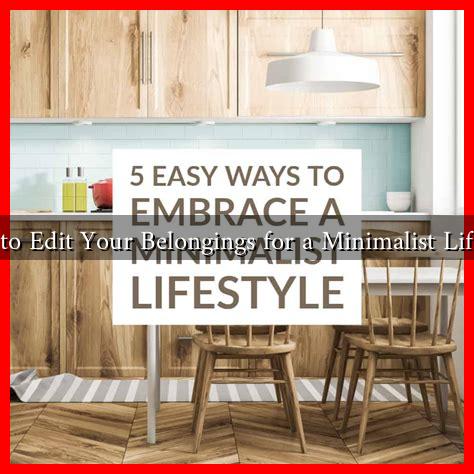-
Table of Contents
- How to Edit Your Belongings for a Minimalist Lifestyle
- Understanding Minimalism
- Why Edit Your Belongings?
- Steps to Edit Your Belongings
- 1. Set Clear Goals
- 2. Start Small
- 3. Use the “One-Year Rule”
- 4. Categorize Your Belongings
- 5. Implement the “Four-Box Method”
- Case Study: The Impact of Minimalism
- Conclusion
How to Edit Your Belongings for a Minimalist Lifestyle
In a world increasingly dominated by consumerism, the minimalist lifestyle has emerged as a refreshing antidote. Embracing minimalism means simplifying your life by reducing clutter and focusing on what truly matters. Editing your belongings is a crucial step in this journey. This article will guide you through effective strategies to declutter your space and embrace a minimalist lifestyle.
Understanding Minimalism
Minimalism is not just about owning fewer items; it’s about making intentional choices that enhance your life. According to a study by the American Psychological Association, clutter can lead to increased stress and anxiety. By reducing your belongings, you can create a more peaceful and organized environment.
Why Edit Your Belongings?
Editing your belongings can lead to numerous benefits, including:
- Reduced Stress: A clutter-free space can help lower anxiety levels.
- Increased Focus: Fewer distractions allow for better concentration on tasks.
- Financial Savings: Buying less means spending less, which can lead to significant savings over time.
- Environmental Impact: Consuming less reduces waste and promotes sustainability.
Steps to Edit Your Belongings
Editing your belongings can seem overwhelming, but breaking it down into manageable steps can make the process easier. Here are some effective strategies:
1. Set Clear Goals
Before you start decluttering, define what minimalism means to you. Consider the following:
- What do you want to achieve by adopting a minimalist lifestyle?
- How do you want your space to feel?
- What items are essential for your daily life?
2. Start Small
Begin with one area of your home, such as a drawer or a closet. This approach prevents overwhelm and allows you to see progress quickly. For example, tackle your kitchen utensils first. You might find that you only need a few essential tools to cook effectively.
3. Use the “One-Year Rule”
Ask yourself if you have used an item in the past year. If not, consider letting it go. This rule helps you identify items that are merely taking up space. For instance, if you haven’t worn a particular piece of clothing in over a year, it may be time to donate it.
4. Categorize Your Belongings
Organize your items into categories such as:
- Keep
- Donate
- Sell
- Trash
This method allows you to see the volume of items you own and make informed decisions about what to keep.
5. Implement the “Four-Box Method”
This method involves using four boxes labeled:
- Keep
- Donate
- Sell
- Trash
As you go through your belongings, place each item in one of the boxes. This visual representation can help clarify your decisions.
Case Study: The Impact of Minimalism
Consider the case of a family that decided to embrace minimalism. After decluttering their home, they reported a 40% reduction in household expenses and a significant decrease in stress levels. They found that with fewer possessions, they could focus more on experiences rather than material goods, leading to a more fulfilling life.
Conclusion
Editing your belongings is a vital step toward embracing a minimalist lifestyle. By setting clear goals, starting small, and using effective strategies like the one-year rule and the four-box method, you can create a more organized and peaceful living space. Remember, minimalism is not about deprivation; it’s about making room for what truly matters in your life. As you embark on this journey, you may find that less truly is more.
For more insights on minimalism and decluttering, consider visiting The Minimalists, a resource dedicated to living a meaningful life with less.

